So you want to start or grow a business?
Launching and running a startup is hard work.
And a great idea is a good start, but if you don’t have the right tools to launch and grow your startup, you’re going to have a bad time.
Using the right tools can mean the difference between getting stuff done and just staring at screens.
The goal here is to build and grow an online business efficiently…So what are these tools exactly?
What are Startup Tools?
In case you didn’t know…
Startup tools are tools created to help run startups (and yes, traditional businesses can use them too).
These tools are mostly online, as that’s where startups typically conduct most business.
Now…
15 Lean Startup Tools to Get More Done!
These tools are mostly online, as that’s where startups typically conduct most business.

There are loads of startup tools available. I mean, just Google it and you’ll see 261,000,000 results!
That’s a lot of choices.
In fact, that’s probably too many choices. So to help you filter out the noise, here are 12 top startup tools…
(some you will recognize & some you may not) as well as alternatives to all the tools mentioned.
Ready?
Let’s go:
#1 NameMesh
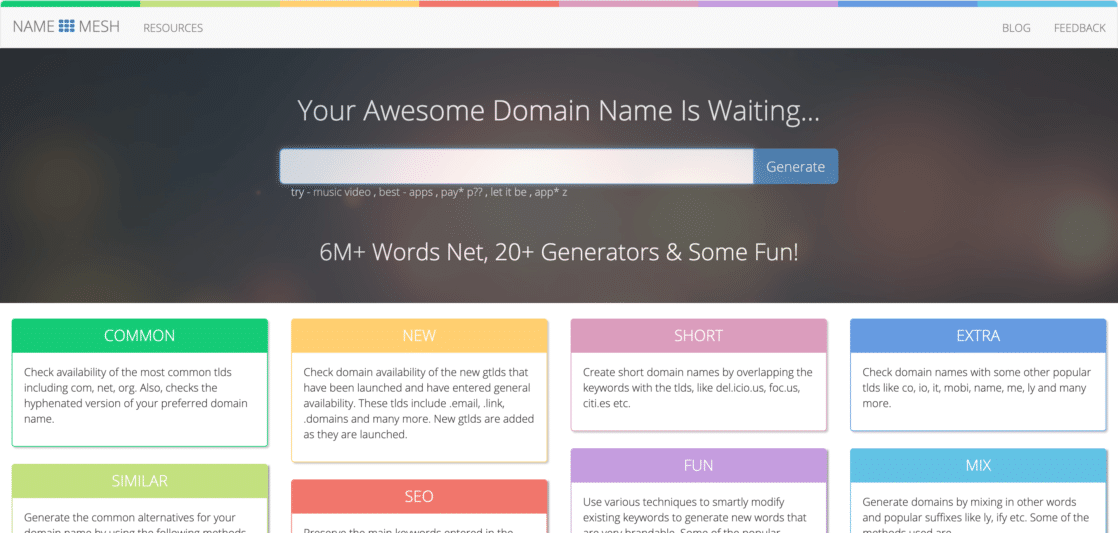
Like all children, your startup needs a name, that’s where NameMesh comes in.
NameMesh is a free website domain name generator. It helps you find the perfect name for your startup. Input a word (like a keyword or an idea) and it finds name trends and ranks them so you get the most relevant suggestions.
Then it suggests the available domain names with the most common domain extensions. Nice.
When it comes to naming your startup, keep it short. Studies show that on average companies names are 22 characters long:

Another thing worth mentioning is try and keep it easy to spell.
Not only does NameMesh show basic suggestions, but also short overlapping names made by throwing together different domain extensions like: del.icio.us, foc.us and citi.es.
Although these can be memorable, they can also be needlessly complex, making it hard for potential customers to actually remember your website.
NameMesh Alternatives
#2 Google G-Suite

Google G Suite is a suite of cloud computing, productivity and collaboration tools developed by, you guessed it: Google.
Inside you’ll find:
- Gmail – for handling emails across multiple devices
- Docs – for writing things like proposals or blog post drafts
- Sheets – for creating fancy spreadsheets
- Hangouts – for live chats with your team
- And lot’s more
You’ve probably used these tools at some point. But did you know that Google also provides templates you can easily modify for your business?
Just head to the template gallery here and make a copy. Inside you’ll find templates for things like proposals, invoices, business letters and more:

G Suite can provide your startup with a scalable and flexible online system without a large investment up front.
They even provide helpful tools to help you get moving in the right direction.
Google G-Suite Alternatives
#3 Cost Calculator
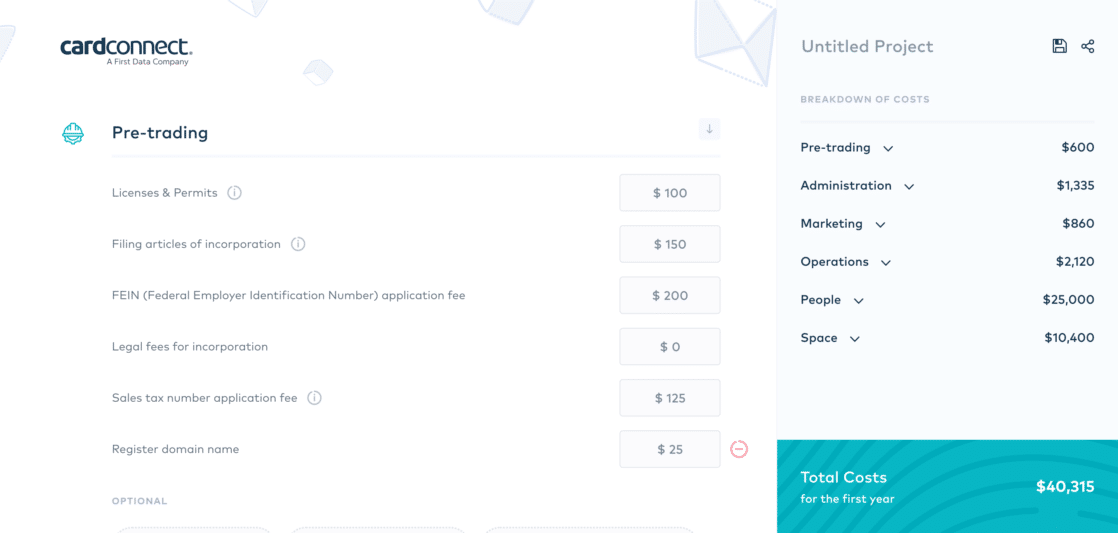
When launching a startup, one of the biggest questions you have will be about money.
82% of businesses that fail do so because of cash flow problems. It’s a sobering thought.
It can be tricky to know how much it’s going to cost to build and launch your startup. That’s where this handy startup cost calculator comes in.
Just choose your budget + size and get working out your costs.
Creating a financial forecast for your business is essential if you want to work out your startup costs, as well as the costs to expect in your first year of business.
Alternative Cost Calculators:
#4 Slack

Everyones heard of Slack right? If not, it’s a messaging app that brings all your communication together in one place via real-time messaging.
Emails generally encourage long, detailed and formal messages. Whereas talking in Slack feels more like a conversation compared to email, so it lends itself well for team discussions.
You can setup channels and groups in order to have conversations around key topics with your team, focusing the discussion and eliminating distractions (hopefully). Also, who doesn’t like to share GIFs?
It’s not just conversations though. Using Slack Actions, you can create tasks from your conversations with virtual assistants or employees to keep your business moving.
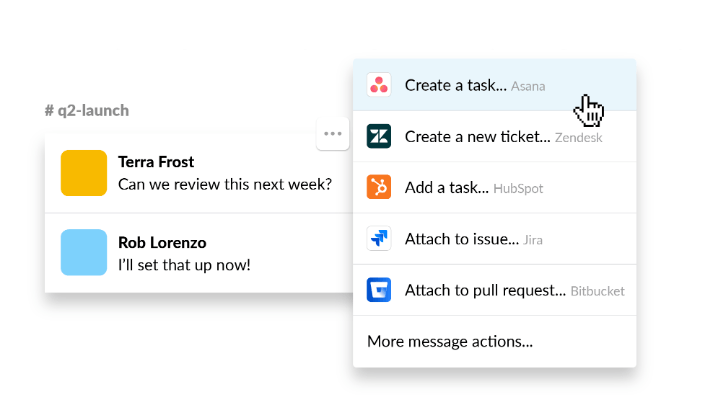
For example, you can set triggers to your project management tool of choice when tasks are mentioned in Slack. This way, everyone knows what to be working on and stays motivated.
Slack Alternatives
#5 Trello

Trello is a visual collaboration platform and project management tool that gives teams perspective on projects. Use Trello for all the C’s – to collaborate, communicate and coordinate on all of your projects.
In the early days of your startup, things are going to be hectic. You won’t have the time to set aside in order to iron out and make processes perfect. But you should at least try.
This is where Trello come in.
Using a pre-planned structure will help your startup. After all, it worked for Trello, growing to over 10 million users from what was once just a prototype app.
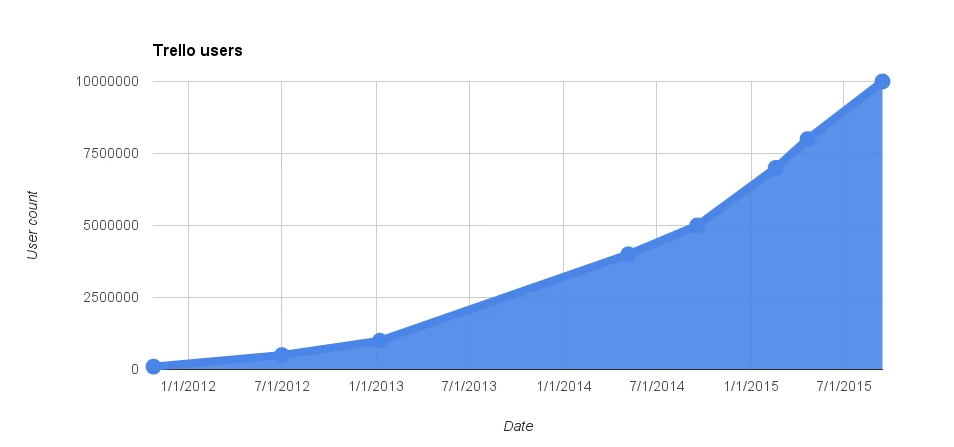
In fact, Trello makes it easy to start using it to plan your startup by providing ready-made templates, including:
- Company Overview – for what’s happening with your team
- Agile Development – for fast moving project management
- Team Onboarding – for getting new hires onboard.
- Simple CRM – for keeping track of customers
- Office Management – for sharing internal information
You can grab these startup templates for free right here.
Trello Alternatives
#6 Google Analytics

Google Analytics is a web analytics service offered by Google that tracks and reports website traffic.
Launching your startup without any measurable analytics goals is like trying to score a goal without, well without any goal to aim for.
To make sure you score growth and development for your business, there’s a few important metrics you’ll want to track:
- Overall Visitors – the number of people visiting your site
- Bounce Rate – the percentage of visitors who leave your site after viewing only one page.
- Average Time on Site – how long people are spending on your site
- Conversion Rate – what percentage of people turn into customers
- Traffic Sources – where your visitors are coming from
- Top Content – what pages get the most traffic
Google even have a gallery of completely free dashboards you can make copies of:
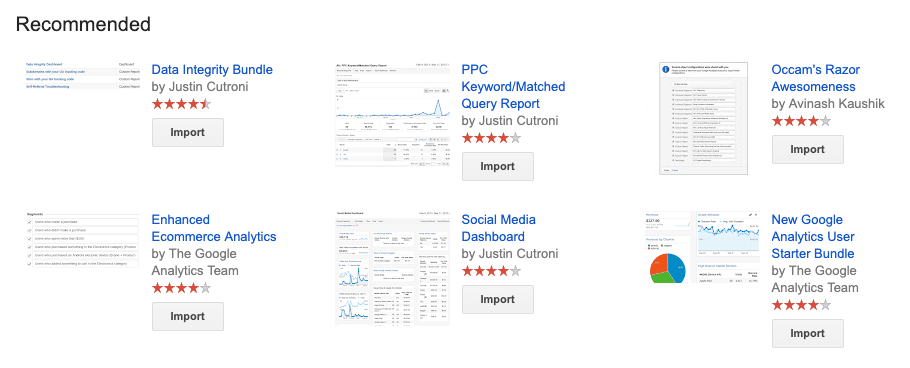
Just head over, import them into your Google Analytics view and then save yourself loads of time by only focusing on the data that matters to you and your business.
We found a great resource you might enjoy to help you out! The Ultimate Beginners Guide to Google Analytics
Google Analytics Alternatives
#7 Drift

Drift is a cloud-based live chat, in-app messaging, and email management solution for sales and marketing teams.
The best way to learn more about your customers is by speaking to them and asking them questions. Using customization live chat widgets, Drift makes this easy.
It’s also what customers want, 42% in fact prefer live chat.
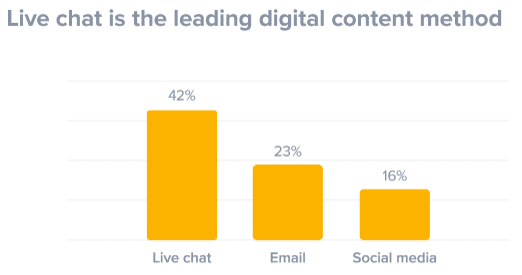
Not only does live chat help with customer service, but it can also help with increasing sales. In fact, 79% of businesses have said that it has had a positive effect on their sales and revenue.
Get live chat installed on your website from day one so you can be collecting customer feedback right away.
Drift Alternatives
#8 MailChimp

MailChimp is a powerful yet easy to use email marketing service. It even helps you design email newsletters, share them on social media, integrates with lots of services and does a sweet job of tracking your results.
Email marketing should be a focus for your startup from the very beginning. Why?
Because it has insane ROI.
And by insane, I’m talking generating $38 for every $1 spent. This works out at 3,800% ROI for email marketing. Not bad.
When it comes to using email marketing to promote your products, there are a few things to keep in mind:
- Having (and growing) an email list for your startup should be a priority
- Email marketing can drive serious revenue
- Remember: good copywriting matters
- Automation can speed up your marketing & improve your brand
- Customize your emails to appeal to your audience where possible
Want to scale your startup quickly? Use email marketing to grow a list of interested and loyal users/customers.
MailChimp Alternatives
#9 Hootsuite
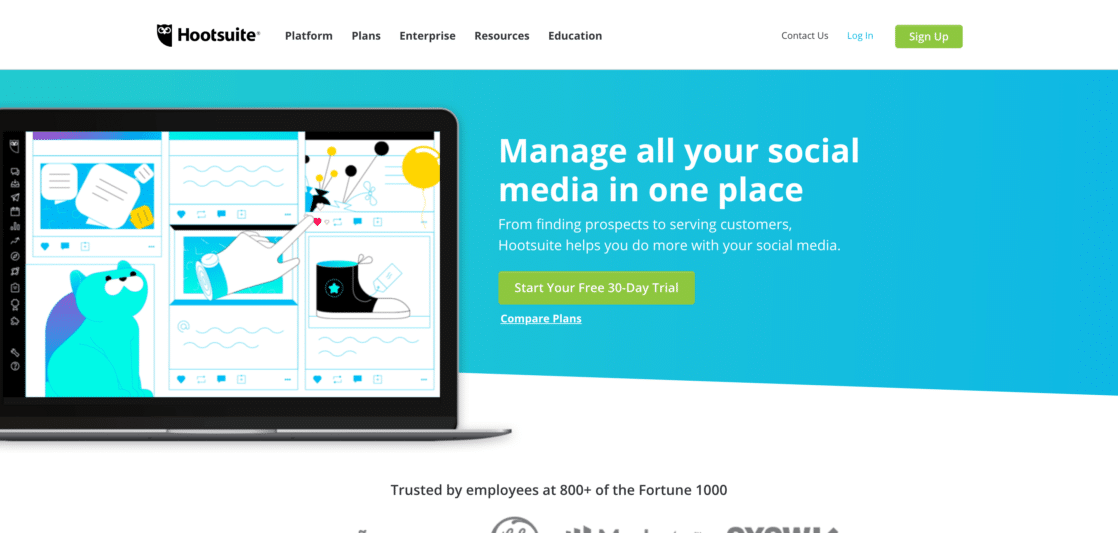
Hootsuite is a social relationship platform that gives you the ability to launch and manage marketing strategies.
In simpler terms: it makes it easier to manage your social media accounts. After all, people spend on 116 minutes per day on social media.
If you want to do well on social media, here are a few things worth keeping in mind:
- Choose the right social networks for your startup, aka: where your potential customers hang out.
- You can potentially save money on customer service by using social media to respond to inquiries and complaints
- You can also use it to expand your team by finding and recruiting new team members
- Probably most importantly, you can use social to build a community of people who like what your startup does.
Hootsuite Alternatives
#10 Ahrefs

Ahrefs is an all-in-one tool set for SEO. It’s like Batman’s utility belt for online marketing.
Ahrefs allows you to do a number of SEO-related tasks including:
- Competitive Analysis – see the keywords your competitors ranks for so you can go after them.
- Keyword Research – find new keywords to target
- Backlink Research – see the links your competitors have for so you can go steal them.
- Content Research – find what content people want to read so you can get a slice of the pie
- Rank Tracking – track your keywords to monitor how you are doing ranking in Google
- Web Monitoring – get alerts whenever someone mentions your site online
If you want to increase website traffic, using a tool like Ahrefs is like using a cheat code.
Ahrefs Alternatives
#11 Zapier
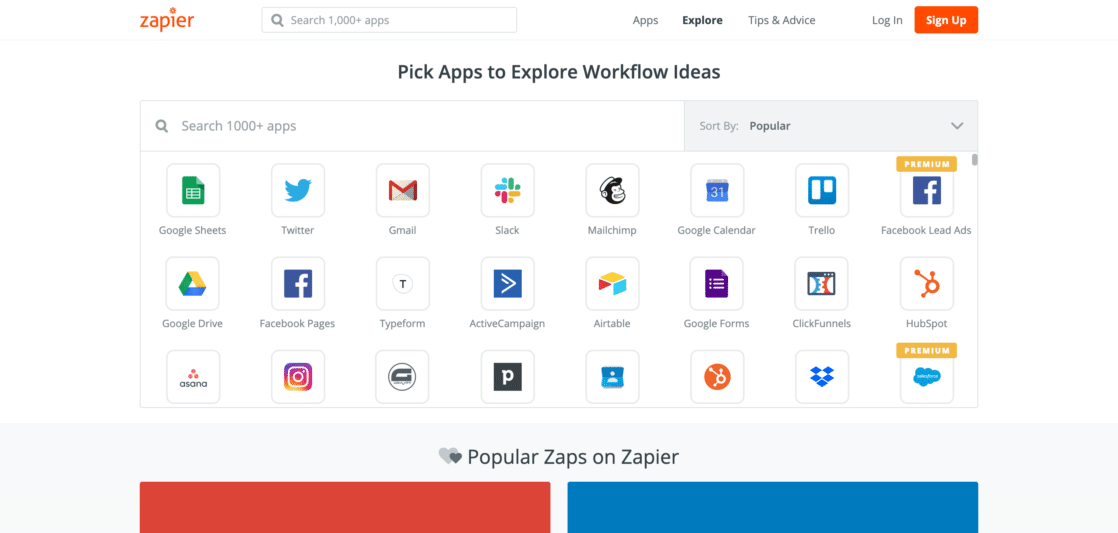
Zapier allows you to connect apps in order to automate your work, without ever touching a line of code.
You can save yourself hours by automating boring and repetitive tasks using Zapier, and you can even combine tasks (called Zaps) together.
So what kind of things can I automate?
I’m glad you asked. Here’s just a selection of some of the tasks you can automate using Zapier:
- Tweet Your New WordPress Posts Automatically
- Send an automatic email in Gmail from new PayPal sales
- Automatically Subscribe PayPal Customers to a MailChimp List
- Subscribe new Facebook Lead Ad leads to a MailChimp list
- Share new paid orders from Shopify to Slack
And don’t forget one of the biggest benefits of Zapier is not having to spend money on (and wait on) hiring a developer to make these custom automations.
Just do it yourself in a few clicks.
Zapier Alternatives
#12 Product Hunt

Last, but by no means least, is Product Hunt, a website that curates the best new products & services every day. It helps you to discover the latest products online from web apps to websites to technology products and everything in between.
On paper, launching your startup is simple. You just submit it.
However to get the most from your launch, there are three stages you want to focus on as part of your launch plan:
- Build-up – try to generate some initial interest in online communities.
- Week before launch – gather a small army of people who can upvote your launch.
- Launch day – the big day. Remember to let everyone know!
A successful launch is only part of a successful startup. The real challenge comes next.
Product Hunt Alternatives
#13 Mailparser & Docparser
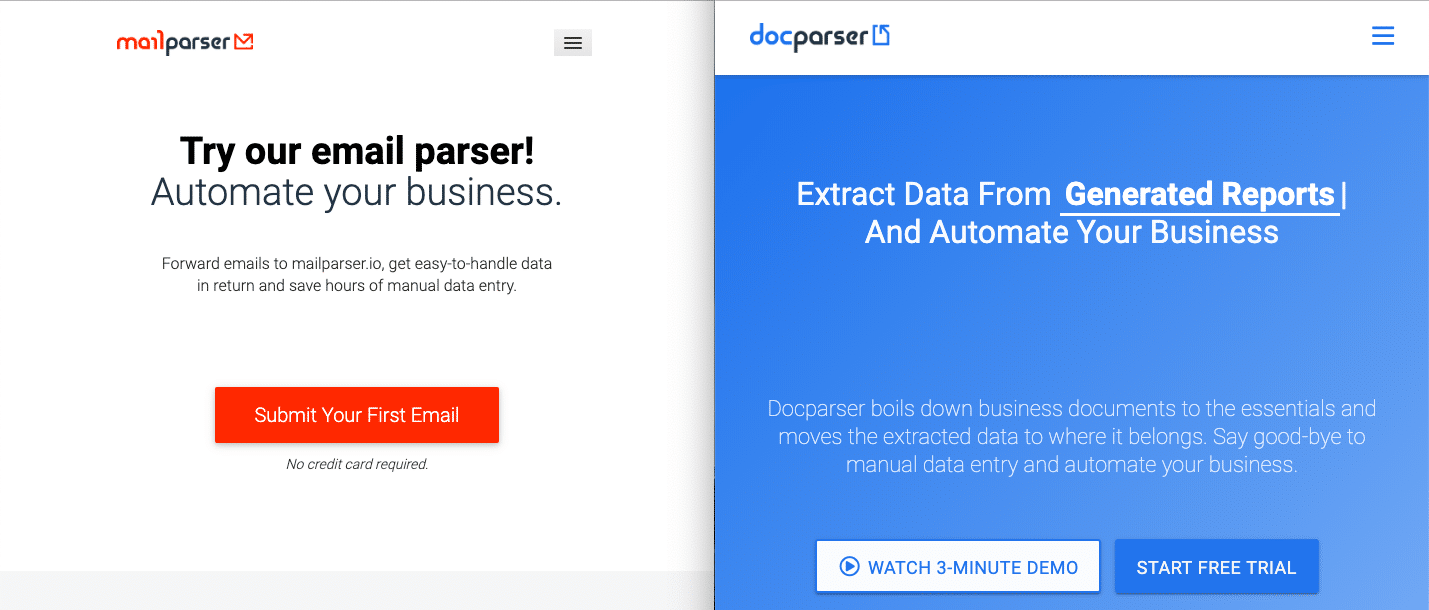
Mailparser and Docparser are both workflow automation tools to help you speed up doing boring business and startup tasks.
Mailparser allows you to extract data from emails and transfer this parsed data to your CRM or spreadsheet. Whilst Docparser allows to automate the extraction of data from PDFs like invoices, contracts, quotes and bank statements.
The biggest advantage here from these two tools is that you can save lots of time by avoiding manual data entry, and instead focus on the tasks that will grow your startup.
Mailparser & Docparser Alternatives
#14 Unsplash

Need some high quality image for your site? Unsplash has you covered. With around 200,000 free to use and high definition images to use however you like, Unsplash is a great resource for finding images to use on your site.
I’ll say it again because it’s such a cool resource: the photos on Unsplash can be used for free, including for commercial purposes. Just use the search box to filter down the type of image you want and hit download.
The images on Unsplash are created by a community of photographers attempting to get exposure for their work.
Unsplash Alternatives
#15 Canva

Canva is an easy to use, drag and drop graphic design tool. It comes loaded with hundreds of templates, graphic assets, and lots of fonts and text stylings.
This tool makes creating high quality (and unique) images for sharing on social media or your blog really simple. Using the pre-made templates means your images will always look right whether you are posting them on Twitter, Instagram, Facebook or even as your YouTube channel header.
It doesn’t even matter if you’ve never designed anything in your life, the drag and drop interface makes it super easy to use. You’ll be creating graphics to promote your startup in no time.
Canva Alternatives
Wrapping this up…
Hopefully this collection of startup tools will help you and your business get to where it needs to be. You probably won’t need all of the tools listed right away.
Instead, you want to pick the tools that are actually going to help your startup with automating, tracking, and growing into a sustainable business.
